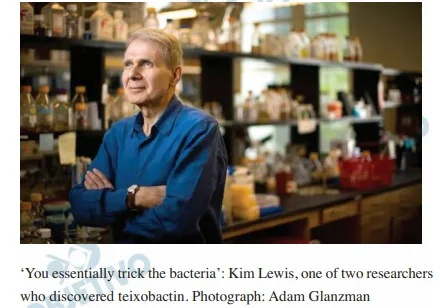Disciplina: Inglês 0 Curtidas
According to the first paragraph, in the sentence - PUC SP 2019
The drugs don’t work: what happens after antibiotics?
Antibiotic resistance is growing so fast that routine surgery could soon become impossible. But scientists are fighting back in the battle against infection

1- The first antibiotic that didn’t work for Debbi Forsythe was trimethoprim. In March 2016, Forsythe, a genial primary care counsellor from Morpeth, Northumberland, contracted a urinary tract infection. UTIs are common: more than 150 million people worldwide contract one every year. So when Forsythe saw her GP, they prescribed the usual treatment: a three-day course of antibiotics. When, a few weeks later, she fainted and started passing blood, she saw her GP again, who again prescribed trimethoprim.
2- Three days after that, Forsythe’s husband Pete came home to find his wife lying on the sofa, shaking, unable to call for help. He rushed her to A&E. She was put on a second antibiotic, gentamicin, and treated for sepsis, a complication of the infection that can be fatal if not treated quickly. The gentamicin didn’t work either. Doctors sent Forsythe’s blood for testing, but such tests can take days: bacteria must be grown in cultures, then tested against multiple antibiotics to find a suitable treatment. Five days after she was admitted to hospital, Forsythe was diagnosed with an infection of multi-drugresistant E coli, and given ertapenem, one of the so-called “last resort” antibiotics.
3- It worked. But damage from Forsythe’s episode has lingered and she lives in constant fear of an infection reoccurring. Six months after her collapse, she developed another UTI, resulting, again, in a hospital stay. “I’ve had to accept that I will no longer get back to where I was,”she says. “My daughter and son said they felt like they lost their mum, because I wasn’t who I used to be.” But Forsythe was fortunate. Sepsis currently kills more people in the UK than lung cancer, and the number is growing, as more of us develop infections immune to antibiotics.
4- Antimicrobial resistance (AMR) – the process of bacteria (and yeasts and viruses) evolving defense mechanisms against the drugs we use to treat them – is progressing so quickly that the UN has called it a “global health emergency”. At least 2 million Americans contract drug-resistant infections every year. So-called “superbugs” spread rapidly, in part because some bacteria are able to borrow resistance genes from neighbouring species via a process called horizontal gene transfer. In 2013, researchers in China discovered E coli containing mcr-1, a gene resistant to colistin, a last-line antibiotic that, until recently, was considered too toxic for human use. Colistin-resistant infections have now been detected in at least 30 countries.
5- “In India and Pakistan, Bangladesh, China, and countries in South America, the resistance problem is already endemic,” says Colin Garner, CEO of Antibiotic Research UK. In May 2016, the UK government’s Review on Antimicrobial Resistance forecast that by 2050 antibiotic-resistant infections could kill 10 million people per year – more than all cancers combined.
6- “We have a good chance of getting to a point where for a lot of people there are no [effective] antibiotics,” Daniel Berman, leader of the Global Health team at Nesta, told me. The threat is difficult to imagine. A world without antibiotics means returning to a time without organ transplants, without hip replacements, without many now-routine surgeries. It would mean millions more women dying in childbirth; make many cancer treatments, including chemotherapy, impossible; and make even the smallest wound potentially lifethreatening. As Berman told me: “Those of us who are following this closely are actually quite scared.”
7- Bacteria are everywhere: in our bodies, in the air, in the soil, coating every surface in their sextillions. Many bacteria produce antibiotic compounds – exactly how many, we don’t know – probably as weapons in a microscopic battle for resources between different strains of bacteria that has been going on for billions of years. Because bacteria reproduce so quickly, they are able to evolve with astonishing speed. Introduce bacteria to a sufficiently weak concentration of an antibiotic and resistance can emerge within days. Penicillin resistance was first documented in 1940, a year before its first use in humans. (A common misconception is that people can become antibioticresistant. They don’t – the bacteria do.)
Oliver Franklin-Wallis Sun 24 Mar 2019
In: https://www.theguardian.com/global/2019/mar/24/the-drugsdont-work-what-happens-after-antibiotics
According to the first paragraph, in the sentence “When, a few weeks later, she fainted and started passing blood, she saw her GP again, who again prescribed trimethoprim”, the fragment passing blood means
a) urinating blood.
b) spitting blood and saliva.
c) sneezing blood with nasal mucus.
d) defecating feces with blood.
Solução
Alternativa correta: D) defecating feces with blood.De acordo com o primeiro parágrafo, a expressão passing blood significa evacuar fezes com sangue.
Assuntos: Expressões
Vídeo Sugerido: YouTube